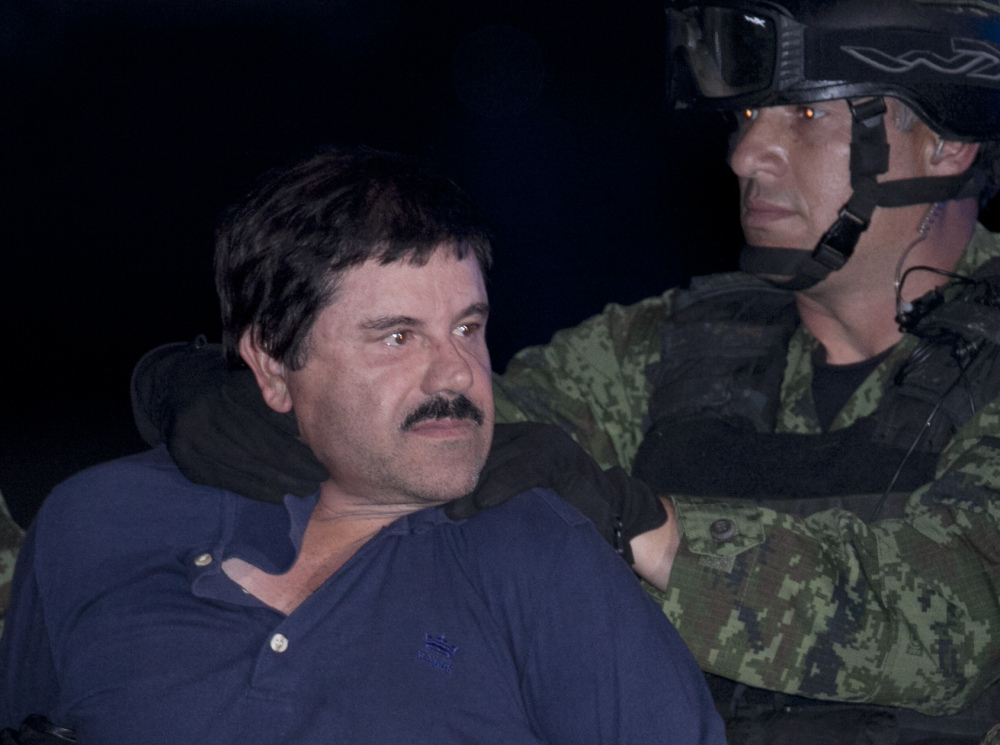MEXICO CITY — Mexico is willing to extradite drug lord Joaquin “El Chapo” Guzman to the United States, a federal law enforcement official said Saturday, a sharp reversal from the official position after his last capture in 2014.
“Mexico is ready. There are plans to cooperate with the U.S.,” said the official, who spoke on condition of anonymity because he wasn’t authorized to comment.
But he cautioned that there could be a lengthy wait before U.S. prosecutors can get their hands on Guzman, the most-wanted trafficker who was recaptured Friday after six months on the run: “You have to go through the judicial process, and the defense has its elements, too.”
Top officials in the party of President Enrique Pena Nieto also floated the idea of extradition, which they had flatly ruled out before Guzman’s embarrassing escape from Mexico’s top maximum security prison on July 11 – his second from a Mexican prison.
“He has a lot of outstanding debts to pay in Mexico, but if it’s necessary, he can pay them in other places,” said Manlio Fabio Beltrones, president of Pena Nieto’s Institutional Revolutionary Party.
But even if Mexican officials agree, Guzman’s attorney Juan Pablo Badillo told the Milenio newspaper that the defense already has filed six motions to challenge extradition requests.
“They can challenge the judge, challenge the probable cause, challenge the procedure,” said Juan Masini, former U.S. Department of Justice attache at the U.S. Embassy in Mexico. “That’s why it can take a long time. They won’t challenge everything at once … they can drip, drip, milk it that way.”
Guzman, a legendary figure in Mexico who went from a farmer’s son to the world’s top drug lord, was apprehended after a shootout between gunmen and Mexican marines at a home in Los Mochis, a seaside city in Guzman’s home state of Sinaloa. Five suspects were killed and six others arrested. One marine was injured.
The operation resulted from six months of investigation by Mexican forces, who located Guzman in a rural part of Durango state in October but decided not to shoot because he was with two women and a child, said Mexican Attorney General Arely Gomez.
After his capture, the head of the powerful Sinaloa Cartel was brought to Mexico City’s airport, marched to a helicopter before news media, and flown back to the same prison he’d fled.
There were immediately calls for his quick extradition, just as there were after the February 2014 capture of Guzman, who faces drug-trafficking charges in several U.S. states.
At the time, Mexico’s government insisted it could handle the man who had already broken out of one maximum-security prison, saying he must pay his debt to Mexican society first.
Then-Attorney General Jesus Murillo Karam said the extradition would happen only after he finished his sentence in Mexico in “300 or 400 years.”
Then Guzman escaped on July 11 under the noses of guards and prison officials at Mexico’s most secure lock-up, slipping out an elaborate tunnel that showed the depth of the country’s corruption while thoroughly embarrassing Pena Nieto’s administration.
Copy the Story LinkSend questions/comments to the editors.



Success. Please wait for the page to reload. If the page does not reload within 5 seconds, please refresh the page.
Enter your email and password to access comments.
Hi, to comment on stories you must . This profile is in addition to your subscription and website login.
Already have a commenting profile? .
Invalid username/password.
Please check your email to confirm and complete your registration.
Only subscribers are eligible to post comments. Please subscribe or login first for digital access. Here’s why.
Use the form below to reset your password. When you've submitted your account email, we will send an email with a reset code.